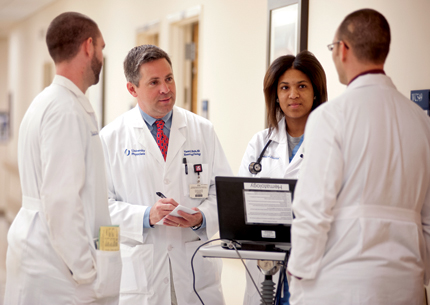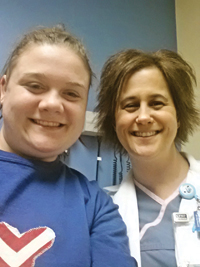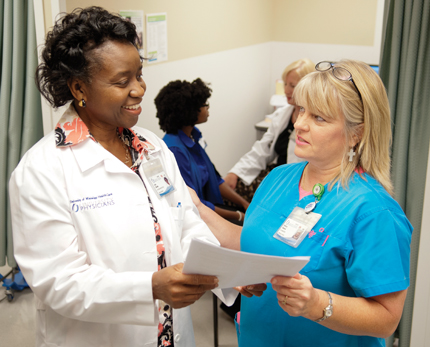Health-care leaders find complex answers to life-shaping question

Published on October 13, 2014
Career or calling: Is your job just a way to make a living, or also a way to make a difference?
For Toni Harris, it was a living – until it became a calling.
For Dr. Vince Herrin, it was a calling – until it became a mission.
For Dr. Joyce Olutade, it was a calling – until it threatened to become just a job.
___
Where was her passion?
Toni Harris couldn’t answer that question.
She had gone to nursing school because her friends had. But a few years after graduation, she searched for something more – something they couldn’t teach her in school.
Then, on the advice of a friend, she visited the pediatric intensive care unit. That’s where she found her answer.

Jones, left, and Harris
“I don’t know what it’s like to lose a child,” Harris said. But she believes she was called to help those who do.
Jay Jones is one of them. About eight years ago, when his daughter Parker was 8, doctors discovered her tumor. Last year, it started to grow.
The family made frequent trips from their home in Greenville to Batson Children’s Hospital, where Parker and Harris met.
“It was easy to like Parker,” her father said. “She was always smiling. And I guess Toni knew all the things Parker had to go through – rashes, fatigue, reactions to the medicine. Maybe Toni does it for everyone, but for whatever reason, she always seemed to go above and beyond.
“She made Parker feel like it wasn’t the end of the world. She made her feel that people really did care. I could say that for the whole staff at Batson.”
In April, it was Harris’ teenage daughter, Ronni McBride, who sang at Parker’s funeral.
It’s been 17 years since she joined the PICU. She has been a nurse practitioner for six, working in neurosurgery, where some children are treated for cancer and tumors that don’t always get better.
“Young nurses and students ask me, ‘How am I going to deal with the death of a child?’” Harris said. She tells them, “You must know what you believe in – before you can deal with something as awful as that.”
At work, Harris is guided by her belief in this verse of Scripture: “Blessed be God . . . who comforteth us in all our tribulation, that we may be able to comfort them which are in any trouble.”
“Learning comes from a book,” Harris said, “but a calling comes from your heart.”
___
Where was his mission?
Dr. Vince Herrin thought he’d found it in the smile of his first leukemia patient.
Clearly exhausted from a hard night on call, he had come by to see her, and she asked about his health.
It’s a moment he can’t forget: The patient who would pass away within the year was worried about her doctor.
Herrin had started out in internal medicine, but the hematology patients he met during his internship rotation won him over. Patients like the young woman. He fell in love with them, he said.
But he realized that many more people in Mississippi needed help. How could he reach them?
The answer came nine years ago when he was asked to become associate program director of UMMC’s Internal Medicine Residency Program; a year later, he was director.
Herrin, who had seen the world on medical missions, had found one in his own backyard.
“Guiding residents in the most medically underserved state in the nation, helping them decide what to do with the rest of their lives – this got ahold of me,” he said.
Practicing medicine, Herrin could treat a lot of patients. But in the residency program, he could touch the lives of many more.
“Through these trainees, these young doctors, we reach thousands of patients we’ll never meet,” he said. “I’ve had some opportunities to do other things and maybe make more money, but I don’t belong in those other jobs.
“This is what I’m supposed to be doing.”
___
Where was her joy?
Dr. Joyce Olutade knew the answer to that question. Buried under a pile of paperwork. Squeezed out of her by pressures to make more money.
“For most who went into medicine, it was not to make a million dollars,” Olutade said. It was to make people well.
“But pay is driven by numbers in primary care. The more patients you see, the more money you generate.”
And the less time you have with each patient.

Olutade speaks to Kathryn Simmons, Student/Employee Health Services nurse.
For half the work week, Olutade is at UMMC as an assistant professor of family medicine and medical director of student/employee health. For the other half, she works in her private practice – that’s where her joy disappeared.
“When a primary care physician sees a patient for the first time, it’s like going on a date,” Olutade said. You break the ice, you decide you like each other. You make more dates. Eventually, the patient refuses to see another doctor.
It was one of these regular patients who came to complain to Olutade. The doctor had been short with her during her previous appointment.
“This is not how you normally treat me,” the woman told her.
Olutade knew it was true. Frustrated, she told the woman she would release her to another doctor.
“The patient said, ‘I’m not going anywhere else.’”
That was when things began to change.
That was when Olutade decided she would continue to spend the “right amount of time” with patients at every visit, even if it meant fewer patients and, so, less income.
“I don’t think Michelangelo would have said, ‘OK, you want to pay me $10, so I’m going to make a sloppy painting,’” she said.
Ten dollars a pop, or a hundred, she would consider her practice a “ministry.”
She took her plan to her husband, Dr. Tunde Olutade, a nephrologist, and he agreed: Their income would shrink, but her time with each patient wouldn’t.
“I rediscovered the joy,” she said, “when I just took care of the patients and let God take care of me.”


